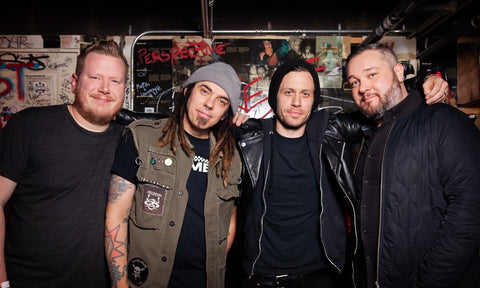
The Suicide Machines
Photo by: Marfa Capodanno
It was in 2006 that Detroit punks The Suicide Machines called it a day after 15 years and six full-throttle, super-charged and confrontational albums. The break didn’t last too long – in 2009, the four-piece crew reconvened to play the occasional local shows and embarked on some even less frequent tours. There was no sign of new material – until now!
Revolution Spring, the band’s seventh album, and first new material since 2005’s War Profiteering Is Killing Us All, will be released March 27th, 2020. What’s more, this new album full of blistering, rousing songs finds the band on truly explosive and energetic form. So why now you may ask? “Everyone just kind of got inspired,” chuckles vocalist Jason Navarro, about the band’s decision to begin making music again. “That’s all. I think we were watching all these other bands ride a wave of nostalgia and we didn’t want to be lumped into that, so we started writing a couple of songs and it went from there.”
Over the course of a couple of years, the band – completed by drummer Ryan Vandeberghe, bassist Rich Tschirhart and guitarist Justin Malek (who is also the drummer in Navarro’s post Suicide Machines outfit Hellmouth) – wrote a total 30 songs. With the help of both Less Than Jake's bassist Roger Lima, who produced Revolution Spring, and The Code's frontman Marc Code, who is their longtime friend and now manager, The Suicide Machines whittled those 30 songs down to the 16 that make up this record. While on the one hand, these songs serve as an overview of the band’s career and the different permutations of punk they’ve dabbled in over the years, it also possess the energy, spontaneity and enthusiasm of a band many years their junior – albeit with the wisdom that comes from being alive for a few decades.
Recorded in “about 12 days” at Rancho Recordo – the studio run by Marc Jacob Hudson, who also plays bass for Laura Jane Grace & The Devouring Mothers – Revolution Spring is a powerful and cohesive combination of hardcore, ska and anthemic punk rock. That, says Navarro, was all fueled by “Awkward Always”, “Black Tar Halo” and “Impossible Possibilities”, the first three songs that the band wrote, all of which made the cut for the record.
“We did those three right off the bat,” says Navarro, “and we were like ‘Wow, these are better than most of the songs Suicide Machines have ever written in any form. That was the start of the spark. It was a long process after that because we were very picky about it, because we wanted to put out the record we wanted to put out and nothing else.”
While Revolution Spring harnesses the belligerent energy that has defined The Suicide Machines since their inception, there are, Navarro says, two marked differences this time around. The first is that these songs are particularly personal.
“This album is legitimately pretty autobiographical,” he says. “A lot of it is very personal – about how I am and where I am now and how I got where I am now mentally. I kind of wanted to leave my children with an understanding of who I am as an older person. Maybe years from now when I’ve passed away, they can pick up the record and look at the lyrics and listen to it and, if they didn’t already know exactly, go ‘Okay, so this is what dad is about.’”
The personal component is especially obvious on “Trapped in A Bomb”, a poignant ode to a close friend Navarro lost to suicide that made the singer open up lyrically, perhaps more than he ever had before.
“I completely burst into tears the first time I had to sing that one,” he admits. “It’s probably one of the hardest things I’ve ever had to sing. I’ve definitely tried to kill myself, but my friend did it. He called me, and an hour later he was dead. This is me saying ‘I’ve made it to this point, and I wish you could have, too.’”
The second overriding difference on this album is the (relatively) newfound optimism possessed by the singer. He started becoming aware of this when he made Oblivion, Hellmouth’s 2016 third full-length. “You wouldn’t think this would be the case with the way the world is looking now,” he admits, “but I’ve become a lot more positive about things. And I stopped pointing fingers and started doing things instead – I feed the homeless a couple of times a week with a bunch of friends of mine, I’ve protested against ICE here in Detroit, I’ve done things locally like water drives for Flint – and I feel like doing these things has created more positivity in my head, whereas before I was being pissed off and not doing anything.”
That’s not to say The Suicide Machines aren’t pissed off on this record, let's be clear on that point. Opener “Bully In Blue” is a breakneck anthem that rallies against police brutality; the jaunty, ska-punk tones of “Babylon of Ours” overlay a harsh indictment of capitalism and American imperialism, and “Flint Hostage Crisis” is a brutal takedown that addresses the lack of clean water in that city – and the fact that nothing has been done to address it. ‘This is what class war really looks like’ snarls Navarro viciously at the end of the brief, belligerent track. Still, he insists, he’s just writing about things close to him, and that he stopped far short of where he otherwise would have done in the past.
“I’m from here,” he says, “so I feel like it’s something we know. My best friend works for the water department there. He’s sold merch for us, so I know a lot about it. I didn’t say ‘Hey, we should hang our governor and kill him’, whereas, maybe 10 years ago I would have. I’m just saying that this is fucked, and this is how these things work and if you think that’s a surprise, it’s not.”
Yet despite all that, and despite the messed-up world these songs reflect so well... and despite this record’s provocative, insurrectionary title – Revolution Spring, is not, first and foremost, a political record. Although it reasserts The Suicide Machines as one of the most formidable and relevant punk bands around, more importantly for Navarro, it documents his personal growth as a human being and where he is at this very moment in time.
“It represents the change inside of me,” he explains. “People might think it’s political, but really it’s me thinking about springtime as rebirth. There’s change inside of me at 46 years old that’s strangely positive somehow. That’s not something I ever expected, because I’ve been a pretty angry person. And I think the other guys are in the same boat. But I could be dead tomorrow – and I’d be absolutely alright with leaving the world with this record.”
Old and new fans alike will find Revolution Spring an energetic homage to the band’s past anthemic, hardcore, ska-punk roots, mixed with the newfound optimism and raw personal life experiences of the band. It’s good to have them back.
Fat Wreck Chords will release Revolution Spring on March 27th.






